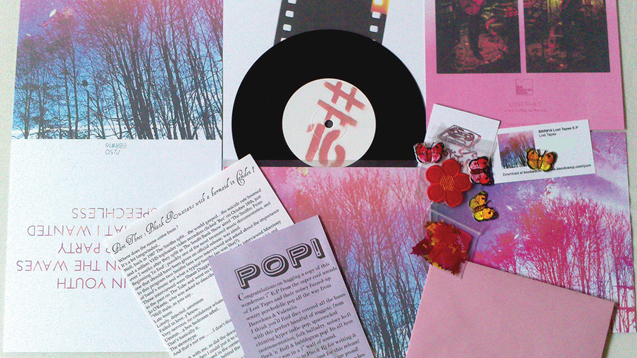Box Bedroom Rebels is a boutique DIY record label established by Manchester-based music nut Kev Rolfe.
Since its inception in 2014, it’s released a string of beautifully crafted seven-inches from the likes of Horsebeach, Temple Songs, Lost Tapes (above) and Water World.
Here, Kev shares his top tips for industrious songwriters and artists thinking of releasing their own vinyl...
Start small: People have to discover you. Start with a small vinyl pressing of 50 to 100 seven-inches with a simple wraparound sleeve that you can sell yourself through free sites like Bigcartel and Bandcamp.
Think local: Search thoroughly for a pressing plant nearby that will do small runs. All offer free quotes and you can put out 100 white label seven-inches for around £450. Avoid pressing plants which are based abroad, as that will delay everything.
Reduce your speed: Release 33rpm seven-inches rather than 45rpm to get more music for your buck. You can get eight and a half minutes per side – that’s 17 minutes in all. If you wanted to, you could easily release a mini LP on a 33rpm seven-inch.
All killer, no filler: Make sure all the tracks are excellent. You have to be ruthless. You’re paying for this so it should to be something you can listen to again and again.
Mixing on the cheap: Record and mix the tracks as you want to hear them on record and send WAV files to the pressing plant. You don’t have to spend a fortune on a sound engineer as the plant will do that for you so the tracks are vinyl-ready.
Get creative: A wraparound seven-inch sleeve is 185mm x 370mm. Get creative and print both sides, have numerous designs, play with the format. Use the personal touch, make them numbered, unique. Or if you want to be completely DIY, photocopy your own sleeves on A3 paper and cut them down.
Added extras: You can get seven-inch record bags from eBay for nothing. Download codes come printable from most sites you buy them off and cost as little as £2 for 200. Offer extra tracks as download exclusives. Add inserts, lyric sheets, stickers, badges; again, the personal touch is everything.
Get out and about: Contact record shops directly to stock your release and use social media. Distributors won’t touch small releases and if they do they’ll want a percentage, which is a loss for you.
Count your beans: Pace yourself financially. A record takes eight to 12 weeks to press. Get that ordered and paid for in one month, then the following month sort out the artwork. The following month you can look around for cheap bulk-buy inserts and extras. By the time all that is done, folded, prepared and ready, your record will be ready for delivery.
boxbedroomrebels.bandcamp.com
For more on licensing your own release, visit prsformusic.com/users/recordedmedia
Since its inception in 2014, it’s released a string of beautifully crafted seven-inches from the likes of Horsebeach, Temple Songs, Lost Tapes (above) and Water World.
Here, Kev shares his top tips for industrious songwriters and artists thinking of releasing their own vinyl...
Start small: People have to discover you. Start with a small vinyl pressing of 50 to 100 seven-inches with a simple wraparound sleeve that you can sell yourself through free sites like Bigcartel and Bandcamp.
Think local: Search thoroughly for a pressing plant nearby that will do small runs. All offer free quotes and you can put out 100 white label seven-inches for around £450. Avoid pressing plants which are based abroad, as that will delay everything.
Reduce your speed: Release 33rpm seven-inches rather than 45rpm to get more music for your buck. You can get eight and a half minutes per side – that’s 17 minutes in all. If you wanted to, you could easily release a mini LP on a 33rpm seven-inch.
All killer, no filler: Make sure all the tracks are excellent. You have to be ruthless. You’re paying for this so it should to be something you can listen to again and again.
Mixing on the cheap: Record and mix the tracks as you want to hear them on record and send WAV files to the pressing plant. You don’t have to spend a fortune on a sound engineer as the plant will do that for you so the tracks are vinyl-ready.
Get creative: A wraparound seven-inch sleeve is 185mm x 370mm. Get creative and print both sides, have numerous designs, play with the format. Use the personal touch, make them numbered, unique. Or if you want to be completely DIY, photocopy your own sleeves on A3 paper and cut them down.
Added extras: You can get seven-inch record bags from eBay for nothing. Download codes come printable from most sites you buy them off and cost as little as £2 for 200. Offer extra tracks as download exclusives. Add inserts, lyric sheets, stickers, badges; again, the personal touch is everything.
Get out and about: Contact record shops directly to stock your release and use social media. Distributors won’t touch small releases and if they do they’ll want a percentage, which is a loss for you.
Count your beans: Pace yourself financially. A record takes eight to 12 weeks to press. Get that ordered and paid for in one month, then the following month sort out the artwork. The following month you can look around for cheap bulk-buy inserts and extras. By the time all that is done, folded, prepared and ready, your record will be ready for delivery.
boxbedroomrebels.bandcamp.com
For more on licensing your own release, visit prsformusic.com/users/recordedmedia

.ashx?h=67&w=80&la=en&hash=340524FD746527338490DF251ABF8B71)



